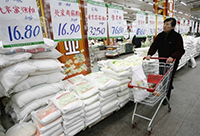A woman shops in a supermarket in Shenyang, northeast China's Liaoning province on April 15, 2008. AFP
Photo: RFA
On March 28, the National Development and Reform Commission (NDRC) said it would raise the government’s minimum purchase prices for rice and wheat in order to fight inflation by encouraging production. The price hike was the second for grain this year, according to China’s official Xinhua news service.
But economists note that raising prices and subsidies would normally push inflation up rather than down.
China is feeling the negative effects of the government’s decision to impose price controls in January after inflation climbed to an 11-year high of 6.9 percent last November. Annual rates have risen as high as 8.7 percent since then. In February, food prices jumped 23.3 percent from a year before.
As economists predicted, the government’s price controls on staple items and fuel have discouraged production, promoted hoarding, and created shortages. The government is now having to pay farmers to produce because price curbs prevent them from making a profit as their costs rise.
Loss of controlIn an interview with Radio Free Asia, Gary Hufbauer, senior fellow at the Washington-based Peterson Institute for International Economics, said that “this policy of trying to control prices by subsidizing people who are losing money—that just feeds on itself.”
“And the subsidies get larger and larger, so you lose more control over the basic finances of the state,” Hufbauer said.
Hufbauer said that price controls on fuels are now also contributing to food supply problems. Some truckers have refused to take trips into the countryside because of diesel shortages, limiting distribution, he said.
David Bachman, a China specialist and political science professor at the University of Washington’s Jackson School of International Studies, said that raising subsidies to fight inflation is basically contradictory.
“This policy is sort of a buying-time type of policy which, as suggested, concedes that they have to take essentially an inflationary measure to try to generate more output to slow down inflation.”
“That’s not sounding like it’s going to be terribly successful,” he said.
A question of timeBachman said that China’s government has been trying for years to keep farmers engaged in grain production while keeping sales prices low. But many have shifted into other areas of production because the costs of inputs like fertilizer have risen faster than grain prices.
Now, with inflation and concerns about shortages, the government has been pushed into paying more subsidies, even though this may make inflation worse.
“They want to have their cake and eat it, too,” Bachman said. “[They want to] take what are probably inflationary measures to encourage production while at the same time preventing the price effects of that from ramifying throughout the system.”
“In the long run, something has to give.”
Gary Hufbauer said the government hopes to avoid the pain of greater reliance on monetary policy to battle inflation. But there is a limit to how long its system of subsidies can go on.
“They’re chasing their tail right now,” Hufbauer said.
“And really, it’s just a question of time before the whole thing breaks down or they lift all the controls and go for a much tighter rein on monetary policy and probably appreciate the exchange rate and go back to a market system.”
Original reporting by Michael Lelyveld. Edited for the Web by Richard Finney.




